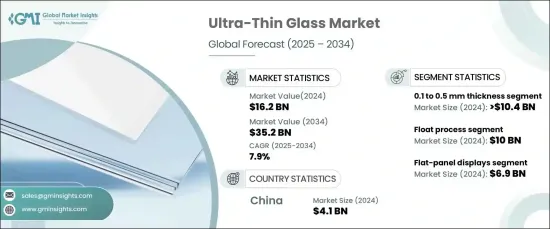
세계의 초박형 유리 시장은 2024년에 162억 달러에 이르렀으며, 2025년부터 2034년에 걸쳐 7.9%의 연평균 성장률(CAGR)로 성장할 것으로 예측되고 있습니다.
이러한 성장은 가볍고 유연하며 내구성이 뛰어난 소재가 필수적인 가전제품, 자동차, 에너지 분야의 수요 증가에 힘입은 것입니다.

0.1-0.5mm 두께 부문은 2024년에 104억 달러를 차지하며 시장을 지배했으며 2025-2034년 동안 7.7%의 연평균 성장률로 꾸준한 성장세를 유지할 것으로 예상됩니다. 이 두께 범위의 초박형 유리는 강도, 유연성 및 투명성의 독특한 조합으로 인해 높은 채택률을 보이고 있습니다. 이러한 특성 덕분에 플렉시블 디스플레이, 웨어러블 기기, 경량 패널 등 정밀도가 요구되는 용도에 매우 적합합니다. 자동차 및 에너지 분야에서는 무게를 줄이고 연비를 개선하며 태양광 패널과 같은 에너지 솔루션을 향상시키기 위해 초박형 유리를 점점 더 많이 사용하고 있습니다. 또한 지속 가능한 고성능 소재에 대한 수요가 증가하면서 초박형 유리의 채택이 증가하고 있으며, 친환경 생산 방법의 발전으로 시장에서 새로운 기회가 창출되고 있습니다.
| 시장 범위 | |
|---|---|
| 시작 연도 | 2024년 |
| 예측 연도 | 2025-2034년 |
| 시작 금액 | 162억 달러 |
| 예측 금액 | 352억 달러 |
| CAGR | 7.9% |
초박형 유리의 핵심 생산 방법인 플로트 공정은 2024년 100억 달러의 가치를 지니고 있으며 2025-2034년 동안 7.8%의 연평균 성장률(CAGR)로 성장할 것으로 예상됩니다. 이 공정은 정밀한 두께의 고품질 균일한 유리 시트를 생산할 수 있어 일관성과 성능이 중요한 용도에 이상적입니다. 플로트 공정은 가전제품, 자동차, 재생 에너지 등 첨단 소재가 필요한 산업에서 점점 더 많이 사용되는 얇고 가벼운 유리의 개발을 지원합니다. 내구성이 뛰어나고 투명도가 높은 유리에 대한 수요를 충족하는 이 공정의 능력 덕분에 시장에서 그 중요성이 계속 커지고 있습니다.
중국은 2024년 41억 달러 규모의 글로벌 초박형 유리 시장을 주도하며 2025년부터 2034년까지 8.8%의 연평균 성장률을 기록할 것으로 예상됩니다. 중국의 시장 지배력은 강력한 소비자 가전 부문, 자동차 산업 성장, 재생 에너지 솔루션에 대한 투자 증가에 힘입어 더욱 강화되고 있습니다. 중국의 생산 기술 발전과 지속 가능성에 대한 관심은 시장 성장을 더욱 가속화하고 있습니다. 글로벌 제조 허브인 중국은 플렉시블 디스플레이, 경량 부품 및 에너지 효율적인 용도에서 초박형 유리에 대한 수요 증가를 충족할 수 있는 좋은 입지를 갖추고 있습니다.
전반적으로 초박형 유리 시장은 기술 발전, 경량 소재에 대한 수요 증가, 전 세계 산업 전반에 걸친 에너지 효율적이고 지속 가능한 솔루션에 대한 강력한 추진에 힘입어 크게 확대될 것으로 전망됩니다.
The Global Ultra-Thin Glass Market reached USD 16.2 billion in 2024 and is projected to grow at a robust CAGR of 7.9% during 2025-2034. This growth is driven by rising demand across consumer electronics, automotive, and energy sectors, where lightweight, flexible, and durable materials are essential.

The 0.1 to 0.5 mm thickness segment dominated the market, accounting for USD 10.4 billion in 2024, and is expected to maintain steady growth at a 7.7% CAGR during 2025-2034. Ultra-thin glass in this thickness range is witnessing high adoption due to its unique combination of strength, flexibility, and transparency. These properties make it highly suitable for applications requiring precision, such as flexible displays, wearable devices, and lightweight panels. In the automotive and energy sectors, ultra-thin glass is increasingly used to reduce weight, improve fuel efficiency, and enhance energy solutions, such as solar panels. Additionally, the growing demand for sustainable and high-performance materials is boosting its adoption, while advancements in eco-friendly production methods are creating new opportunities in the market.
| Market Scope | |
|---|---|
| Start Year | 2024 |
| Forecast Year | 2025-2034 |
| Start Value | $16.2 Billion |
| Forecast Value | $35.2 Billion |
| CAGR | 7.9% |
The float process, a key production method for ultra-thin glass, was valued at USD 10 billion in 2024 and is anticipated to grow at a CAGR of 7.8% throughout 2025- 2034. This process ensures the production of high-quality, uniform glass sheets with precise thickness, making it ideal for applications where consistency and performance are critical. The float process supports the development of thin, lightweight glass, which is increasingly used in industries requiring advanced materials, such as consumer electronics, automotive, and renewable energy. The process's ability to meet the demand for durable, high-clarity glass drives its continued significance in the market.
China leads the global ultra-thin glass market, contributing USD 4.1 billion in 2024, with a projected CAGR of 8.8% from 2025 to 2034. The country's market dominance is fueled by its strong consumer electronics sector, growing automotive industry, and increasing investment in renewable energy solutions. China's advancements in production technologies and focus on sustainability are further accelerating the market growth. As a global manufacturing hub, China is well-positioned to meet the rising demand for ultra-thin glass in flexible displays, lightweight components, and energy-efficient applications.
Overall, the ultra-thin glass market is set for significant expansion, driven by technological advancements, increasing demand for lightweight materials, and a strong push for energy-efficient and sustainable solutions across industries worldwide.